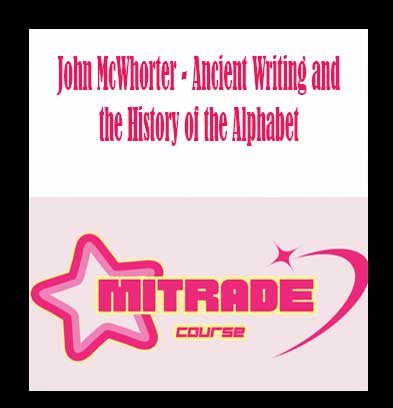Natalie Schilling – English in America: A Linguistic History
Description
English in America: A Linguistic History , Natalie Schilling – English in America: A Linguistic History download
Natalie Schilling – English in America: A Linguistic History
English in America: A Linguistic History
Follow a Professor of Linguistics to trace the history of our language from the Jamestown settlement to our modern era of mass immigration, globalization, and Internet communication.
LECTURE (12)
01:Defining American English Dialects
Begin with a big-picture overview of the American English dialect map, asking as we explore: What is the difference between a language, a dialect, and an accent? Discover the intricate rules governing all linguistic systems, and consider how and why some varieties of language become valued standards and others are stigmatized….
02:The Foundations of American English
The main English dialect hubs in the new American colonies were centered on Jamestown, New England, and Philadelphia. See how these were influenced by contact with Native American languages, Spanish, French, Dutch, and the West African languages of slaves, and learn about the five stages of development English dialects typically undergo everywhere English is spoken in the world….
03:From English in America to American English
Explore how the English settlers gradually transformed themselves from colonists to American citizens, and how English in America became American English. Myriad dialects began to coalesce, and there was an explosion of linguistic creativity, especially in the creation of dialect words – Americanisms like “raccoon” and “bifocal”….
04:The Rise of American Language Standards
In the 1800s, America began looking inward, not to England, for its language standards. The new norms were recorded in dictionaries, spelling books, and grammars, and celebrated in a profusion of distinctly American literary works. Noah Webster, Ralph Waldo Emerson, Walt Whitman, and Mark Twain are all key figures in this stage in the historical development of American English….
05:Where Is General American English?
Our journey continues with the westward expansion of American English, as the New England dialect spreads across the North, the South extends to the Southwest, and people in the middle increasingly intermingle. Along the way, dialect mixing and leveling lead to increasing standardization, or at least the ideal of a single, uniform standard, and “General American English” is born. But where is it, …
06:Mapping American Dialects
What do you call a big road where you drive fast: highway, parkway, freeway, or something else? How do you pronounce the word “been”: with the vowel in “sit,” “see,” or “set”? Take a quiz and see where your linguistic usages place you on the American dialect map. Delve into how linguists who study dialects – sociolinguists, dialectologists, and dialect geographers – get data to make their dialect …
07:Ethnicity and American English
America has always been a land of immigrants, and American English has been shaped since its earliest days by contact among immigrants from all over the British Isles and from around the world. Consider how the languages of the many immigrants who poured into America in the 19th and early 20th centuries gave rise to distinctive ethnic dialects of American English, and how they left their mark on A…
08:African American English
Explore the indelible linguistic effects of the peoples of African descent who were brought to America as slaves, who went on to develop a richly expressive language variety that today is emulated by young people across the world-African American English. Contrary to common misunderstandings, this well-studied dialect is governed by intricate and consistent rules….
09:Mobility, Media, and Contemporary English
Moving into 20th-century America, examine how changes in movement patterns of peoples, and of information, have affected language change. Consider population movements from rural to urban to suburban-and then back to the city again; the Civil Rights Movement; and the increasing influence of Hollywood media and the dawn of the Internet age….
10:The History of American Language Policy
What’s the official language of the United States? What should it be? See how American language policies and language attitudes have shifted back and forth over the centuries, from periods of relative tolerance for non-English languages in the U.S., to times of heightened fear for the “safety” of English in America, and concurrent attempts at stricter language legislation. Is there reason to worry…
11:Latino Language and Dialects in America
In the late 20th and early 21st centuries, America has seen an upsurge in immigration, much as it did at the dawn of the 20th. Investigate the effects of immigrants from Latin America on American English, and confront a fear facing some native speakers of American English: Is Spanish taking over, and do we need language policies to prevent this? Also explore the native English varieties developed …
12:Where Is American English Headed?
Secure as a major player on the world stage, the U.S. can now look inward and focus on the intra-national linguistic and cultural diversity that’s been there since English speakers first arrived on the American continent. Discover that regional dialect differentiation is actually increasing, not receding, even in the Internet age, and consider the development of English as it continues to spread a…
DETAILS
Overview
Would you address a group of people as: you guys,” “yinz,” “y’all,” or something else? Your answer can provide insight into who you are. American English has a colorful history, influenced by contact between many cultures. Dialect variations are widespread, reflecting and shaping changes in our society. The many American EnglishES represent who we have always been as a nation: e pluribus unum-out of many, one.”
About
Natalie Schilling
If we approach language not as grammarians – as guardians of proper usage-but as scientists-as linguists-then we need to study human language as it really is, not how we think it should be.
ALMA MATER
The University of North Carolina, Chapel Hill
INSTITUTION
Georgetown University
Dr. Natalie Schilling is an Associate Professor of Linguistics and head of a research project at Georgetown University called Language and Communication in Washington, DC. She earned a doctorate in Linguistics from The University of North Carolina at Chapel Hill, where she also received a bachelor’s degree in English, and she holds a master’s degree in English from North Carolina State University.
Dr. Schilling has appeared on a number of NPR programs, and has authored and contributed to articles in national publications. She is the author of Sociolinguistic Fieldwork, coauthor of American English: Dialects and Variation (third edition), and coeditor of The Handbook of Language Variation and Change (second edition). She has conducted forensic linguistic investigation of speaker profiling and authorship attribution, applying expertise in American English dialect variation to casework.
Dr. Schilling is keenly interested in American literature as well as American linguistics, especially in the works of Nathaniel Hawthorne, Ralph Waldo Emerson, Walt Whitman, and Mark Twain. She specializes in the study of language variation and change in American English dialects, including regional, ethnic, and gender-based language varieties. Dr. Schilling’s main expertise is stylistic variation: how and why individuals use different language styles as they shape and reshape personal, interpersonal, and group identities and relations.
Commonly Asked Questions:
- Business Model Innovation: Acknowledge the reality of a legitimate enterprise! Our approach involves the coordination of a collective purchase, in which the costs are shared among the participants. We utilize this cash to acquire renowned courses from sale pages and make them accessible to individuals with restricted financial resources. Our clients appreciate the affordability and accessibility we provide, despite the authors’ concerns.
- English in America: A Linguistic History Course
- There are no scheduled coaching calls or sessions with the author.
- Access to the author’s private Facebook group or web portal is not permitted.
- No access to the author’s private membership forum.
- There is no direct email support available from the author or their team.










Reviews
There are no reviews yet.